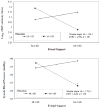Social support and socioeconomic status interact to predict Epstein-Barr virus latency in women awaiting diagnosis or newly diagnosed with breast cancer
- PMID: 22004465
- PMCID: PMC3254856
- DOI: 10.1037/a0025599
Social support and socioeconomic status interact to predict Epstein-Barr virus latency in women awaiting diagnosis or newly diagnosed with breast cancer
Abstract
Objective: Both higher socioeconomic status (SES) and supportive personal relationships confer health benefits, including better immune function. This study assessed the joint impact of SES and social support on the expression of a latent herpesvirus, Epstein-Barr virus (EBV), in a group of highly stressed women.
Methods: Two-hundred and twenty four women either awaiting further evaluation following an abnormal mammogram or newly diagnosed with breast cancer completed questionnaires and provided blood samples to assess EBV viral capsid antigen (VCA) IgG antibody titers.
Results: More highly educated women with more support from friends had lower EBV VCA antibody titers, reflecting a stronger cellular immune response to the latent virus; however, among less educated women, friend support was not associated with EBV antibody titers. As revealed in an ancillary analysis, more highly educated women with more friend support had lower systolic blood pressure (SBP); however, friend support was not associated with SBP among less educated women. Neither depression nor perceived stress mediated these associations. Neither cancer status nor cancer stage among those diagnosed with cancer was significantly related to these outcomes.
Conclusion: Lower SES women may not reap the same immunological benefits from friend support when experiencing a stressful life event as their higher SES counterparts.
Figures
Similar articles
-
Childhood adversity and herpesvirus latency in breast cancer survivors.Health Psychol. 2013 Mar;32(3):337-44. doi: 10.1037/a0028595. Epub 2012 Jul 2. Health Psychol. 2013. PMID: 22746260 Free PMC article.
-
Attachment anxiety is related to Epstein-Barr virus latency.Brain Behav Immun. 2014 Oct;41:232-8. doi: 10.1016/j.bbi.2014.04.002. Epub 2014 Jun 16. Brain Behav Immun. 2014. PMID: 24945717 Free PMC article.
-
The differential impact of training stress and final examination stress on herpesvirus latency at the United States Military Academy at West Point.Brain Behav Immun. 1999 Sep;13(3):240-51. doi: 10.1006/brbi.1999.0566. Brain Behav Immun. 1999. PMID: 10469525
-
The Effect of Perceived Stress on Epstein-Barr Virus Antibody Titers in Appalachian Ohio Women.Neuroimmunomodulation. 2017;24(2):67-73. doi: 10.1159/000478658. Epub 2017 Sep 22. Neuroimmunomodulation. 2017. PMID: 28934729
-
Serological Evidence for the Association Between Epstein-Barr Virus Infection and Sjögren's Syndrome.Front Immunol. 2020 Oct 30;11:590444. doi: 10.3389/fimmu.2020.590444. eCollection 2020. Front Immunol. 2020. PMID: 33193425 Free PMC article.
Cited by
-
Childhood adversity and herpesvirus latency in breast cancer survivors.Health Psychol. 2013 Mar;32(3):337-44. doi: 10.1037/a0028595. Epub 2012 Jul 2. Health Psychol. 2013. PMID: 22746260 Free PMC article.
-
Psychoneuroimmunology and the research of Janice Kiecolt-Glaser: It informs self-care and the practice of medicine.Compr Psychoneuroendocrinol. 2024 Aug 22;20:100260. doi: 10.1016/j.cpnec.2024.100260. eCollection 2024 Nov. Compr Psychoneuroendocrinol. 2024. PMID: 39258160 Free PMC article. Review.
-
Understanding the intersection of race and place: the case of tuberculosis in Michigan.BMC Public Health. 2019 Dec 11;19(1):1669. doi: 10.1186/s12889-019-8036-y. BMC Public Health. 2019. PMID: 31829165 Free PMC article.
-
The Interactive Effects of Education and Social Support on Blood Pressure in African Americans.J Gerontol A Biol Sci Med Sci. 2022 Feb 3;77(2):e98-e106. doi: 10.1093/gerona/glab289. J Gerontol A Biol Sci Med Sci. 2022. PMID: 34612486 Free PMC article.
-
Childhood adversity and cell-mediated immunity in young adulthood: does type and timing matter?Brain Behav Immun. 2013 Feb;28:63-71. doi: 10.1016/j.bbi.2012.10.018. Epub 2012 Oct 26. Brain Behav Immun. 2013. PMID: 23108062 Free PMC article.
References
-
- Adler N, Boyce T, Chesney M, Cohen S, Folkman S, Kahn R, et al. Socioeconomic status and health. American Psychologist. 1994;49:15–24. - PubMed
-
- Adler N, Rehkopf D. Us disparities in health: Descriptions, causes, and mechanisms. Public Health. 2008;29(1):235. - PubMed
-
- Arora N, Finney Rutten L, Gustafson D, Moser R, Hawkins R. Perceived helpfulness and impact of social support provided by family, friends, and health care providers to women newly diagnosed with breast cancer. Psycho Oncology. 2007;16(5):474–486. - PubMed
-
- Basco MR, Krebaum SR, Rush AJ. Outcome measures of depression. In: Strupp HH, Horowitz LM, Lambert MJ, editors. Measuring patient changes in mood, anxiety, and personality disorders. Washington D. C: American Psychological Association; 1997. pp. 207–245.
-
- Bastien CH, Vallieres A, Morin CM. Validation of the insomnia severity index as an outcome measure for insomnia research. Sleep Medicine Reviews. 2001;2(4):297–307. - PubMed
Publication types
MeSH terms
Substances
Grants and funding
LinkOut - more resources
Full Text Sources
Medical
Research Materials


